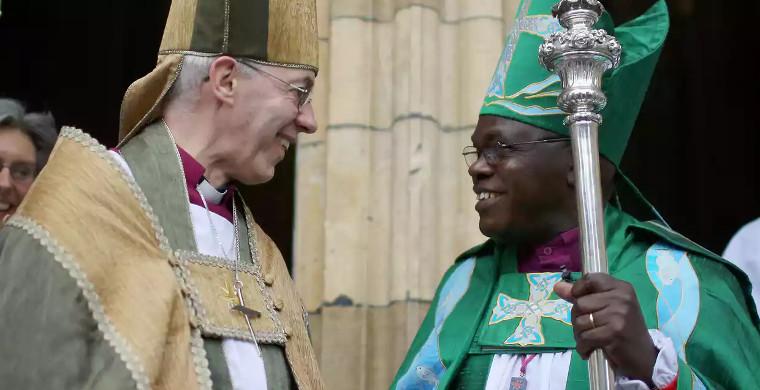C of E archbishops call on Christians to repent for Reformation split
Justin Welby and John Sentamu recall ‘damage done five centuries ago’ that saw Christian people pitted against each other
By Harriet Sherwood Religion correspondent
https://www.theguardian.com/
17 January 2017
It unleashed an orgy of death and destruction across Europe. In England alone, more than 800 monasteries, abbeys, nunneries and friaries were seized, libraries were destroyed, manuscripts lost, treasures stripped and works of art appropriated. Thousands of people were hung, drawn and quartered, or burnt at the stake for their religious beliefs.
Five hundred years after the Reformation, the religious revolution that swept across Europe, the leaders of the Church of England - itself created in the decades of upheaval - have called on Christians to repent for the divisions, persecution and death.
The archbishops of Canterbury and York issued a statement on Tuesday recalling “the lasting damage done five centuries ago to the unity of the Church, in defiance of the clear command of Jesus Christ to unity in love”.
After 500 years of schism, will the rift of the Reformation finally be healed?
Justin Welby and John Sentamu, the two most senior figures in the C of E, said: “Those turbulent years saw Christian people pitted against each other, such that many suffered persecution and even death at the hands of others claiming to know the same Lord. A legacy of mistrust and competition would then accompany the astonishing global spread of Christianity in the centuries that followed.”
All this “leaves us much to ponder”, they said.
This year’s commemorations, their statement concluded, should lead all Christians “to repent of our part in perpetuating divisions. Such repentance needs to be linked to action aimed at reaching out to other churches and strengthening relationships with them”.
Throughout 2017, churches across Europe will mark the 31 October anniversary of Martin Luther nailing his 95 theses protesting against the corruption of the Roman Catholic church to a church door in Wittenberg, Germany. The act lit the fuse of the greatest schism in western Christianity and triggered a string of religious wars across Europe.
Luther fundamentally challenged the authority and elitism of the Catholic church. His theses, written in Latin, were a backlash against the highly profitable sale of indulgences – promoted as fast-track tickets to heaven – to fund the building of St Peter’s Basilica in Rome. He declared that when it came to “justification” – avoiding hell or gaining admission to heaven – there could be no mediation, no brokering by the church. Salvation was a matter between an individual and God.
This revolutionary stance was swiftly translated into German and other European languages, and Luther’s ideas spread across Europe within weeks thanks to new printing presses, triggering religious, political, intellectual and cultural upheaval.
Rome condemned him as a heretic, removed him from the priesthood and banned his writings. In response, the monk publicly burned the papal bull, or edict. The sale of indulgences plummeted and his ideas took hold.
As well as widespread bloodshed the Reformation unleashed terrible destruction of religious heritage and art, but it also gave rise to new forms of art, music and literature.
In England, Henry VIII – angered by the pope’s refusal to allow him to divorce Catherine of Aragon and marry Anne Boleyn – broke with Rome and established himself as the head of the Church of England.
The archbishops’ statement, issued on the eve of Christian unity week, follows a plea last autumn by Pope Francis for “forgiveness for divisions perpetuated by Christians from the two traditions”.
The leader of the Roman Catholic church said the anniversary of the Reformation was an “opportunity to mend a critical moment of our history by moving beyond the controversies and disagreements that have often prevented us from understanding one another”.
The separation “has been an immense source of suffering and misunderstanding”, the pontiff said.
Francis has put ecumenicalism at the heart of his papacy, building on a slow rapprochement between the Catholic and Protestant traditions. In September, the leaders of the Catholic and main Protestant churches in Germany issued a joint text calling for a “healing of memories” of past divisions.
There are, however, fiercely traditionalist elements in both denominations opposed to any moves towards closer relations, let alone unity.
Welby and Sentamu’s statement also pointed to the “great blessings … to which the Reformation directly contributed.
“Amongst much else these would include clear proclamation of the gospel of grace, the availability of the Bible to all in their own language and the recognition of the calling of laypeople to serve God in the world and in the church,” they wrote.
END














